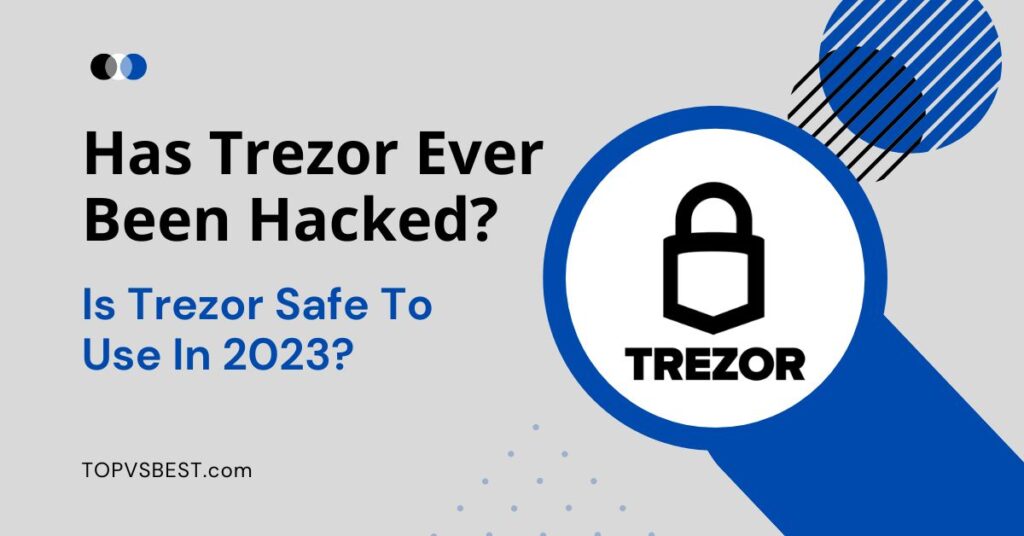Overview: What Is Trezor Wallet?
Trezor is a popular hardware wallet designed for secure cryptocurrency storage. It was launched in 2014 by SatoshiLabs, a Czech Republic-based company specializing in developing cryptocurrency-related products.
Trezor is one of the oldest and most trusted hardware wallets available today. It is designed to protect digital assets from online threats such as hackers and malware.
With Trezor wallets, users can securely store their private keys, access their cryptocurrency assets, and execute transactions without exposing their sensitive information to the internet.
But has Trezor ever been hacked? In our report, we will review the incidents of 2019 and 2022 and discuss what they mean for security in the crypto world.
Importance Of Security In Cryptocurrency
The importance of security in cryptocurrency cannot be overstated. Cryptocurrency transactions are irreversible, and no central authority can retrieve lost or stolen funds.
That makes it essential to keep private keys secure at all times. Hardware wallets like Trezor are specifically designed to provide a high level of security and protect users’ assets from theft and other malicious activities.
They offer a physical layer of security that makes it virtually impossible for hackers to access private keys stored within them.
Therefore, it is crucial for anyone who holds cryptocurrency to prioritize security and consider using a hardware wallet like Trezor to protect their investments.
What Makes Trezor Different From Other Hardware Wallets?
Trezor hardware wallets were created by SatoshiLabs in 2014 and have become one of the most trusted hardware wallets on the market today. Unlike software wallets, which store private keys on a device connected to the internet, hardware wallets like Trezor store private keys offline, making them much more secure.
Trezor wallet works by generating a seed phrase, a set of words that can be used to restore access to the wallet if it is lost or damaged.
The seed phrase is used to create private keys that are stored on the Trezor device.
When a user wants to access their cryptocurrency assets or execute a transaction, they must enter their PIN code to unlock the device and sign the transaction. This process ensures that private keys are never exposed to the internet, reducing the risk of theft or hacking.
Its open-source design sets Trezor apart from other hardware wallets, allowing for greater transparency and community participation in its development.
Trezor also supports a wide range of cryptocurrencies, making it a versatile option for users who hold multiple assets.
Additionally, Trezor offers advanced security features like passphrase protection and multi-factor authentication, which further enhance the security of the device.
Has A Trezor Wallet Ever Been Hacked?
Trezor has had a couple of security incidents in the past.
2019 Firmware Vulnerability (also Kraken Trezor Hack)
In 2019, a firmware vulnerability was discovered (as reported in Cointelegraph) that could potentially allow an attacker to extract the private keys stored on a Trezor device.
However, the attacker would need physical access to the device and advanced technical knowledge to exploit the vulnerability.
Trezor promptly released a firmware update to address the vulnerability and advised users to update their devices as soon as possible.
Also, according to Trezor, if users use a passphrase as an additional security measure, they can mitigate the Kraken Trezor hack type of attack.
The company also emphasized the importance of physical security and reminded users never to leave their Trezor devices unattended or in possession of an untrusted third party.
2022 Phishing Attack
In 2022, there was a phishing attack where some users were directed to a fake Trezor website and entered their private key information. The hackers were able to steal some funds from the affected users.
Trezor responded by warning users about the phishing attack and advising them always to check the URL of the website they are using to access their wallets.
The company also reminded users that they would never ask for their private key information and encouraged them to report any suspicious activity.
(There was also a story in the news about Trezor lawsuit against Mailchimp and its parent company Intuit regarding the phishing email.)
Response Of Trezor To These Incidents
Trezor has demonstrated a commitment to promptly addressing security incidents and communicating clearly to its users.
While no system can be completely immune to security threats, Trezor has taken steps to ensure that its devices remain among the most secure hardware wallets available in the market.

Current Security Measures
Trezor has several security measures in place to protect users’ cryptocurrency assets and its users’ identities, and online accounts.
One of the key features is multi-factor authentication, which requires users to provide two or more pieces of evidence to verify their identity. This could include a password, PIN code, or biometric data like a fingerprint. By requiring multiple factors for authentication, Trezor adds an extra layer of protection against unauthorized access.
Another essential security feature of Trezor is PIN protection. When users set up their Trezor device, they must create a PIN code required to unlock the device and access their private keys. The PIN code is encrypted and never leaves the device, ensuring that it remains secure even in the event of a physical breach.
Trezor also supports passphrase protection, which is an additional layer of security for users who want to protect their funds further. A passphrase is a unique string of characters that is required to access a specific wallet on the device. This means that even if an attacker gains access to the device, they would still need to know the passphrase to access the funds stored in that particular wallet.
Finally, Trezor provides a recovery seed, a sequence of 12 or 24 words that can be used to restore access to the wallet in the event of loss or damage. The recovery seed is generated by the device during setup and should be kept in a safe place separate from the device. With the recovery seed, users can restore their wallets and access their funds even if their Trezor device is lost or damaged.
Overall, Trezor’s security measures provide a high level of protection against hacking and theft, making it a reliable option for those who want to keep their cryptocurrency assets secure.
Is Trezor or Ledger safer? What are Ledger and Trezor wallet supported coins? These questions and more in our Trezor VS Ledger: Which Hardware Wallet Is Best In 2023.
Community Reviews
Trezor has received a lot of positive feedback from the cryptocurrency community for its strong security features and ease of use. Many users appreciate the device’s ability to store a wide range of cryptocurrencies and its open-source design. Trezor’s customer support is also often praised, with many users reporting prompt and helpful responses to their inquiries.
However, although minimal, there have been some negative reviews of Trezor as well. Some users have reported difficulty setting up and using the device, particularly those less tech-savvy. Others have criticized the device’s price, which is higher than some other hardware wallets on the market.
Despite these negative reviews, the overall satisfaction rate for Trezor is high. Many users value the security and peace of mind that comes with using a hardware wallet to protect their cryptocurrency assets. Trezor remains a popular choice among cryptocurrency enthusiasts and investors who prioritize security and reliability.
FAQs
Can you trust hardware wallets? Has a hardware wallet ever been hacked?
As you have read in our article, there were incidents where hardware wallets could be potentially hacked. But overall, hardware wallets are the safest and most trusted way to store cryptocurrency.
How secure is Trezor? Can Trezor Model T be hacked?
Trezor is considered one of the most secure hardware wallets. There were no “real-world” hacks that the company did not address.
Which is the safest hardware wallet?
Trezor, Ledger, and CoolWallet are considered the safest.
Conclusion
Trezor is a secure and reliable hardware wallet that provides a high level of protection for cryptocurrency assets. The device’s multi-factor authentication, PIN protection, passphrase protection, and recovery seed features make it difficult for hackers to gain access to private keys and steal funds.
While Trezor has experienced some security incidents in the past, the company has responded quickly and transparently to address any vulnerabilities and improve its security measures.
The cryptocurrency community has given Trezor positive reviews for its security, customer support, and ease of use.
For those looking for a secure hardware wallet to store their cryptocurrency, Trezor is a great option.
It is essential always to follow best practices for securing cryptocurrency, such as keeping recovery seeds in a safe place, using strong passwords and PIN codes, and never sharing private key information with anyone.
By using Trezor and following these guidelines, cryptocurrency investors can rest assured that their assets are safe and secure.
Was Ledger wallet hacked? Read our Has Ledger Been Hacked? Is Ledger Still Secure In 2023?



My Trezor wallet was recently hacked and all of my tokens were stolen. I have always been extremely cautious both online and offline, I never shared my seed phrase with anyone, and I was the only person with access to it. Despite taking these precautions, someone was still able to gain access to my wallet and transfer out my assets without my authorization. This situation raises serious concerns for me about the security of Trezor Wallet, as I cannot understand how this breach occurred if my recovery phrase was never exposed. Additionally, I found the support response to be unhelpful and lacking clear guidance during a very stressful situation. I’m currently working with a hacker named cyberianx I got to meet through teIegraam and he has been able to trace the funds to an atomic wallet. I’m hoping I can get everything I lost back following his process.